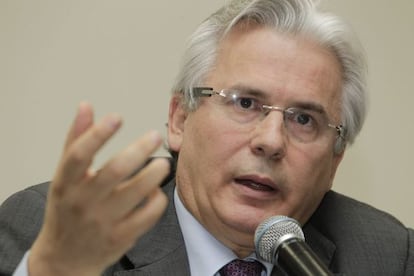Garzón asks Pope Francis to open Vatican files on Argentina abuses
Spanish former judge says Rome holds information that could help ongoing investigations into the Dirty War

Former High Court Judge Baltasar Garzón issued a plea on Thursday to Pope Francis I, asking him to release the Vatican’s files from the 1976-1983 Dirty War in Argentina to help in the ongoing investigations into human rights violations during the military dictatorship.
“As a state with diplomatic representation, the Vatican received reports from its diplomats in Argentina,” Garzón said in Buenos Aires, where he was taking part in a ceremony to pay tribute to the victims of the military regime. “During that time, the Mothers and Grandmothers of the Plaza de Mayo sent letters to Pope Juan Paul II. It would be good if the pope opens an investigation.”
Garzón, who was suspended from the High Court last year in a controversial move by the Supreme Court, which accused him of breaching his bench duties in a political corruption case, now works as an advisor for the human rights committee in the Argentinean Congress.
Some 30,000 people are said to have disappeared, been tortured or killed during the military dictatorship that ruled Argentina after President María Estela “Isabel” Martínez de Perón was ousted from office in March 1976.
The pope had nothing to do with the dictatorship; he conducted behind-the-scenes diplomacy"
Buenos Aires Archbishop Jorge Bergoglio, who became Pope Francis earlier this month, has not publicly discussed the Dirty War period since his election. However, accusations, based on reports and documented evidence, have surfaced in Argentina that Bergoglio, who was a superior in the Jesuit order at that time, knew about the abuses but failed to do anything about them. On March 15, the Vatican said in a statement that there has never been a credible accusation against the pope.
In the 2007, Hebe de Bonafini, the president of the Association of the Mothers of the Plaza de Mayo, called Bergoglio “a fascist” and accused him of “being part of the group of bishops that killed our children.”
But on Friday De Bonafini had a change of heart. “Today I hear a lot of friends tell me about how you have offered your dedication and work in the poor neighborhoods. I am so happy to know about your work and I feel there is hope for change at the Vatican,” she wrote in an open letter to Pope Francis that was posted on the website of the human rights group she presides.
Argentinean Nobel Peace Prize winner Adolfo Pérez Esquivel met with the pope on Thursday and later told reporters that he was convinced that Bergoglio had never cooperated with the dictatorship. “The pope had nothing to do with the dictatorship. He wasn’t an accomplice and nor was he was one of the bishops who actively defended human rights, but he conducted behind-the-scenes diplomacy in asking for those who had disappeared or were in jail,” said Pérez Esquivel, who won the prize in 1980 for his work against the dictatorship.
Tu suscripción se está usando en otro dispositivo
¿Quieres añadir otro usuario a tu suscripción?
Si continúas leyendo en este dispositivo, no se podrá leer en el otro.
FlechaTu suscripción se está usando en otro dispositivo y solo puedes acceder a EL PAÍS desde un dispositivo a la vez.
Si quieres compartir tu cuenta, cambia tu suscripción a la modalidad Premium, así podrás añadir otro usuario. Cada uno accederá con su propia cuenta de email, lo que os permitirá personalizar vuestra experiencia en EL PAÍS.
¿Tienes una suscripción de empresa? Accede aquí para contratar más cuentas.
En el caso de no saber quién está usando tu cuenta, te recomendamos cambiar tu contraseña aquí.
Si decides continuar compartiendo tu cuenta, este mensaje se mostrará en tu dispositivo y en el de la otra persona que está usando tu cuenta de forma indefinida, afectando a tu experiencia de lectura. Puedes consultar aquí los términos y condiciones de la suscripción digital.








































